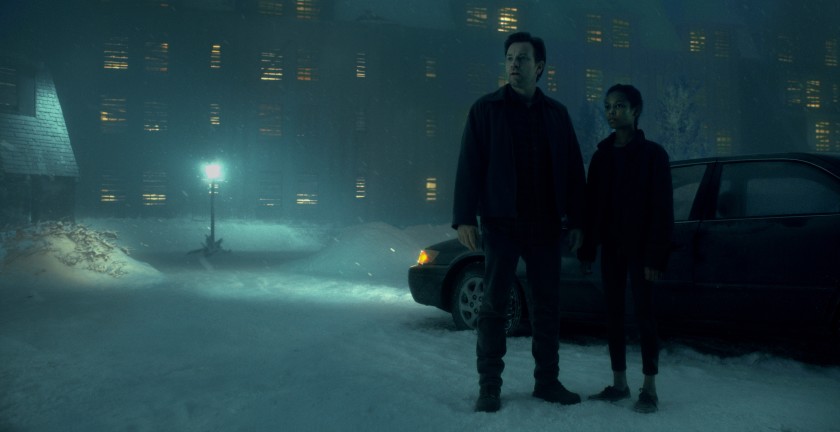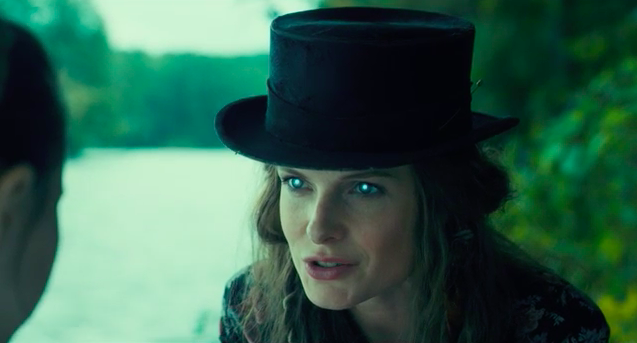Doctor Sleep (2019)

DIRECTOR: Mike Flanagan
CAST: Ewan McGregor, Kyliegh Curran, Rebecca Ferguson, Cliff Curtis
REVIEW:
Thirty-six years after publishing The Shining, Stephen King published a follow-up, Doctor Sleep, further expanding on themes and concepts he had introduced in the first novel through the life of now-adult Danny Torrance. For Warner Bros., the allure of making a sequel (of sorts) to The Shining (adapted to film by Stanley Kubrick in 1980) was too much to resist, but screenwriter-director Mike Flanagan had a tricky task ahead of him, both adapting one of King’s dense, complicated, thematically rich works, and attempting to bridge a long-standing divide: being both reasonably faithful to King’s book while also doing some tweaking to serve as a more direct sequel to Kubrick’s film, which differed from the book in some significant ways (and which King famously disliked). Flanagan has mostly succeeded. While a little overlong and drawn-out, Doctor Sleep largely stands on its own (apart from the climax), telling a very different kind of story from The Shining but serving up some of the same slow burn. Perhaps most welcome, it serves up complicated concepts rather than a lazy reliance on jump scares and conventional horror tropes. In fact, it’s more a drama/thriller than a horror movie, which might disappoint some viewers attracted by its connections to The Shining.
We open shortly after the harrowing events of The Shining, with young Danny Torrance (Roger Dale Floyd, replacing the original Danny Lloyd) living in Florida with his mother (Alex Essoe, standing in for Shelley Duvall) and trying to mentally recover from the trauma he experienced at the now-abandoned Overlook Hotel. This is made harder by the fact that one of the Overlook’s menagerie of ghouls, specifically the naked decaying woman from Room 237, has followed him, wanting to feed on his “Shine” (the name for his psychic powers, hence the title of “The Shining”), but with a little mentoring from the ghost of Dick Hallorann (Carl Lumbly, replacing Scatman Crothers, who got axed by Danny’s father in The Shining), the boy finds out how to defeat them. The experiences take a toll on his psyche, however, and when we catch up with adult Danny (Ewan McGregor), he’s a homeless drunk riding a bus to anywhere. Danny ends up in a quiet New England town where, with the help of a sympathetic townsman (Cliff Curtis), he finds an apartment and a job and purpose working with hospice patients where his knack—amplified by his psychic powers—at comforting his patients and helping them pass away in peace earns him the nickname “Doctor Sleep”. Eventually, another purpose falls into Danny’s lap when he makes a telepathic connection with a young girl, Abra (newcomer Kyliegh Curran), in need of the same mentoring Hallorann gave him. But Danny isn’t the only one whose attention Abra has attracted. She’s also the target of a cult of energy vampires called The True Knot and their leader, Rose the Hat (Rebecca Ferguson), who sustain their own virtual immortality by killing and draining the life force—called “steam”—of children who possess “the Shine”. Danny steps up as Abra’s defender, but their quest will eventually lead him to face the demons of his past—literally—and step back through the Overlook’s doors.
Those who go into Doctor Sleep expecting something more along the lines of The Shining might be disappointed. There are creepy moments, but overall it’s less of a straight-up horror movie than a drama/thriller with supernatural elements, and the narrative trajectory, while featuring some concepts like “the shining”, telepathy, mind palaces, astral projection, and energy vampires, that might be a little “out there” for mainstream viewers, is more straightforward than The Shining. The movie isn’t interested in jump scares, which are entirely absent. Which is not to say it’s entirely devoid of disturbing moments; an extended sequence in which the True Knot abducts, tortures, and murders a young boy (Jacob Tremblay) doesn’t do much beating around the bush and is disturbing to the point of being uncomfortable to watch. It’s also not action-oriented and unspools at a leisurely pace (maybe a little too leisurely; especially the opening acts feel a little excessively dragged-out, and some scenes could have been trimmed or cut for a less sluggish pace). The first half or so is a slow burn, as we jump across three time periods—1980, 2011, and 2019—and set up three parallel tracks—Danny, Abra, and Rose’s cult—who eventually intersect on a collision course. The movie takes its time with set-up, arguably a little too much time; it’s quite a while into the movie before Danny, Abra, and Rose are even aware of each other’s existences, and further still before the main plot—Danny/Abra versus Rose—really kicks into full gear.
In order to bridge the differences between the book and movie adaptations of its predecessor, Flanagan’s script does some nifty tweaking. For example, Dick Hallorann survived The Shining on paper, but met his demise at the hands of an axe-wielding Jack Nicholson in the movie, but the film adaptation of Doctor Sleep works around this by having Danny visited by Hallorann’s ghost. The biggest difference is the climax when, after having followed two-thirds of the novel fairly faithfully, the movie serves up an entirely different 11th hour, but one that also cleverly allows the book ending of The Shining (which likewise is substantially different from the movie version) to finally be brought to the screen, only with a role reversal. Actually, while it will surely be anticipated by many audience members, and there’s an undeniable momentary tingle when we finally return to the Overlook Hotel (accentuated by the instantly recognizable, ominous theme from the 1980 movie kicking in), this is somewhat disappointingly the weakest portion of the movie. Up until then, Doctor Sleep has been content to work on its own terms and do its own thing without an over-reliance on the original movie, but in the 11th hour it veers off into nostalgic autopilot and takes us back down memory lane, including the hedge maze, a familiar bar, and cameos by the twins who want Danny to play with them forever and forever. Something feels uninspired and perfunctory about the way we tick off the checklist of “remember this?” bits from the original movie; in fact, Ready Player One arguably did a better job paying homage to The Shining than its own onscreen sequel. It’s not enough to fatally damage the movie, but it feels like a bit of a lazy way to wrap things up.

Ewan McGregor is solid, if not spectacular, in a role that requires him to look haggard and hungover at first, then later lets him show slight shades of Obi-Wan Kenobi as he steps up to the plate playing mentor to a child who needs the same guidance he got once upon a time. Danny is a haunted and tormented figure with a good heart seeking redemption and closure, and McGregor does a capable job of navigating his character arc. Two other principals are more scene-stealing, however. First is newcomer Kyliegh Curran, who brings fire and energy to a challenging role, shows both light and potentially dark sides to Abra (whose first name is not a coincidence), and has enough chemistry with McGregor for us to buy the mentor-pupil bond at the film’s emotional crux. Second is Rebecca Ferguson, who continues to defy typecasting and here relishes her silver-tongued villainess, playing Rose the Hat with slinky veiled menace. Rose and her henchmen aren’t cliched obvious villains; she traipses barefoot around their camp and meditates atop her RV like a hippie flower child, and her followers are blandly ordinary-looking. She uses seduction as her tool, illustrated when she lures a teenage girl (Emily Alyn Lind) into her ranks, and drops the veil when she doesn’t need it anymore. In the supporting cast are a couple familiar faces, Cliff Curtis as Danny’s best friend and Bruce Greenwood in a small role as his AA sponsor. Emily Alyn Lind and Jacob Tremblay make impressions in limited screentime. Danny Lloyd, who played Danny Torrance all the way back in 1980 and hasn’t acted since, makes a bit part cameo here at director Flanagan’s invitation. The only “off” notes are struck by a couple characters from The Shining shoehorned into the proceedings here and recast with different actors. Alex Essoe and Henry Thomas are distractingly unconvincing stand-ins for Shelley Duvall and Jack Nicholson; their appearances tug one out of the movie and the lack of a digitally inserted young Nicholson, when similar things are an increasingly common effect in recent years, feels like a disappointing missed opportunity. On the other hand, Carl Lumbly nails Dick Hallorann. There’s no jarring effect here; Lumbly is so spot-on to the original Scatman Crothers in both looks and voice that he is easily accepted as the same character.
Doctor Sleep isn’t perfect—it’s slow-paced, overlong, and some of its slightly trippy concepts might be a bit “out there” for mainstream viewers—but it represents something more complex and thematically rich than your average horror movie, and in fact it’s only loosely-categorized as a horror movie at all, bearing more resemblance to a drama with supernatural and thriller elements. In a movie landscape oversaturated with remakes and unnecessary sequels, it’s something original and off-the-beaten-track, sufficiently engrossing and compelling to be worth a look for those to whom that appeals.
* * *